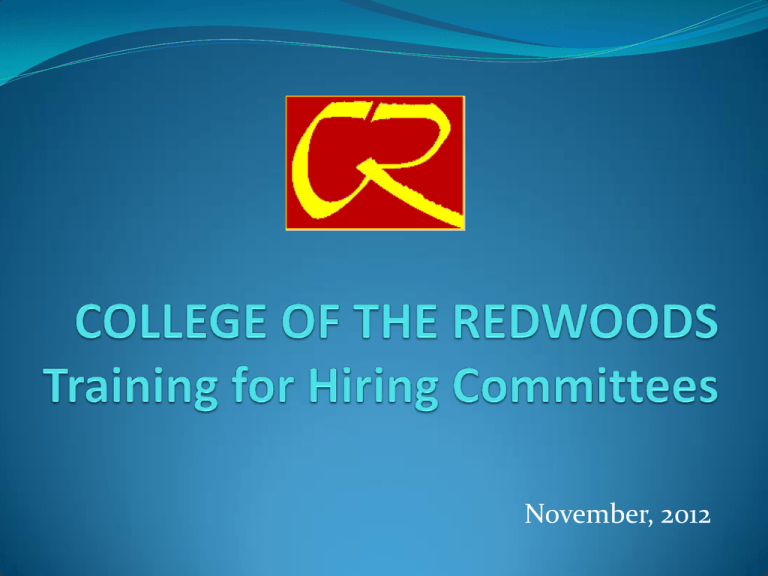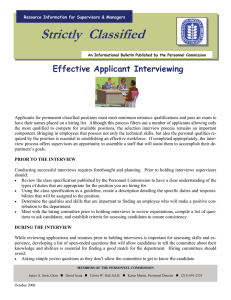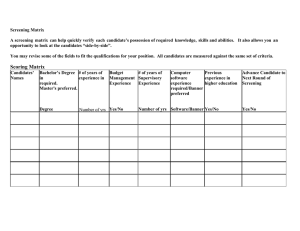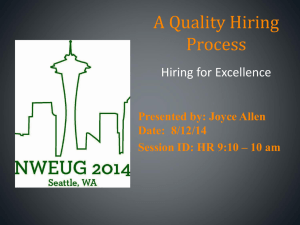November, 2012
advertisement

November, 2012 Goal of the Committee To help select the most qualified candidates who will stimulate the learning or working environment and provide the greatest asset to our diverse student population and the greater campus community. To help select personnel who are qualified for the respective positions and who support the programs and services of the college, as well as the college’s mission, vision, and values. CR’s Mission College of the Redwoods puts student success first by providing outstanding developmental, career technical, and transfer education. The College partners with the community to contribute to the economic vitality and lifelong learning needs of its service area. We continually assess student learning and institutional performance and practices to improve upon the programs and services we offer. CR’s Values Student Success and Access: We put students first, ensuring that student learning, advancement, and access are pivotal to all we do. Educational Excellence and Innovation: We value ongoing and systematic planning and evaluating methods that move us toward excellence. Honoring Diversity: We value all members of our community and strive to create a diverse, nurturing, honest, and open environment. Participatory Governance: We value ethical behavior and strive to create a culture where all students, staff, faculty and administrators engage in inclusive, ongoing and self-reflective decision making. Environmental Awareness: We value the environment and the need to minimize our impacts upon it, utilizing sustainable practices and acting as global citizens. Community Development: We value the economic and intellectual development of the various communities we serve. Supportive Culture: We strive to create a supportive, problem-solving culture, and we recognize the proven usefulness of an interest-based approach (IBA) for achieving trust, cooperation and effective problem solving. Diversity in an Educational Community A diverse educational community recognizes the educational benefits that flow from employee populations that are varied by race, gender, disability status, belief, age, national origin, cultural background, life experience and other enriching characteristics. (Source: EEO Plan, 2012) Committee Chair Responsibilities Guide, direct, facilitate, and oversee committee meetings. Assist EEO Monitor in maintaining compliance with all district policies and procedures and state and federal laws. Create a climate of trust to ensure full participation by all committee members. Gather from committee and submit to HR screening criteria and questions for approval. Ensure the completion of and give final consideration to reference check responses. Submit names of finalists for further review/hiring consideration. Committee Member Responsibilities These responsibilities apply to the Committee Chair as well. Support the mission, vision, and values of the college. Actively participate in the process. Participate in discussion of screening criteria. Assist in development of interview questions/topics. Evaluate candidates for minimum qualifications and desirable criteria. Be fair and consistent in applying the evaluation criteria. Participate in interviews of candidates. Committee Member Responsibilities (continued) Recommend finalists for continued consideration or hiring consideration. Maintain confidentiality before, during, and after the process has been completed. Notify the EEO Monitor or the Director of Human Resources if you discover an unfair or biased practice occurring. EEO Monitor Responsibilities • The role of the EEO Monitor is to assist in ensuring that the hiring process is free from unlawful discrimination. • The monitor serves as a nonvoting member of the screening committee. • The monitor assists the process and must not do anything to appear to lobby for a particular candidate. EEO Monitor Responsibilities (cont’d) THE EEO MONITOR SHALL: Monitor the hiring process to ensure that no candidate is unlawfully discriminated against. Verify committee objectively assesses applicants based on the knowledge, skills, and abilities necessary to job performance. Verify the committee does not discuss or consider information obtained from sources outside the interview process. Ensure full participation of all committee members. THE EEO MONITOR SHALL (CONT’D): Serve as committee liaison to the Equal Employment Opportunity (EEO) Officer - Director of HR Report allegations of noncompliance to the EEO Officer. Halt the process if appropriate. Ensure that all screening materials are returned to HR. Assist the committee, if needed, with identifying components of “model” answers to interview questions. CR Board Policy 3410 ~ Nondiscrimination This policy reaffirms the Board of Trustees’ commitment to providing an educational and employment environment with full and equal access. It also: Recognizes the district’s responsibility to provide opportunities for full participation in the college experience; Supports a college spirit of inclusion and openness and a celebration of the strengths that diversity brings to the campus; Prohibits discrimination on the basis of ethnic group identification, national origin, religion, age, sex, race, color, ancestry, sexual orientation, or mental or physical disability. Federal Laws Title VII of the Civil Rights Act of 1964 prohibits discrimination on the basis of race, color, religion, sex, or national origin. Title VI of the Civil Rights Act of 1964 prohibits discrimination on the basis of race, color, or national origin in any program receiving Federal financial assistance. Federal Laws (cont’d) The Americans With Disabilities Act of 1990 prohibits discrimination against the disabled in employment and public services. Age Discrimination Act of 1975 prohibits discrimination on the basis of age in programs or activities receiving Federal financial assistance. (Age 40 +) State Laws California Government Code Sec. 11135 through 11139.5 prohibits discrimination against any person or denial of benefits on the basis of race, national origin, ethnic group identification, religion, age, sex, sexual orientation, color or any mental or physical disability under any program that is funded directly by the State or receives any financial assistance. California Fair Employment & Housing Act, Calif. Government Code 12900, et seq., prohibits discrimination in employment on the basis of race, gender, religious creed, color, national origin, ancestry, physical handicap, medical condition, marital status, sex, and age. Conflicts of Interest It is your responsibility to recognize potential biases or conflicts of interest. Relatives, close personal friends or a dislike of someone so compelling that you cannot remain fair or impartial. Not revealing a conflict of interest could lead to a complaint of an unfair hiring practice. Advisement You need to immediately notify the Director of Human Resources if there is a breach in confidentiality or a conflict of interest arises. Failing to disclose a conflict of interest, a breach in confidentiality, or personal bias toward a candidate may result in removal from the committee and/or participation on future hiring committees. The Hiring Process HR works with manager of area and/or respective VP to develop job announcement, including minimum qualifications and desirable characteristics. HR announces vacancies in various publications to draw a diverse pool of applicants. HR compiles all materials from applicants for committee members. The Hiring Process (cont’d) HR works with VP’s, Division Chairs/ Deans, Academic Senate and Classified Union to form committees. HR acts in an advisory capacity to all committees to ensure fairness and adherence to all state and federal laws and local policies and procedures. The Hiring Process (cont’d) The committee: meets to identify/clarify screening criteria selects candidates to be interviewed develops interview questions selects finalists for hiring consideration and second interviews The Hiring Process (cont’d) For faculty and administrative positions, additional interviews may be conducted by the President. Skills tests may be administered for all hiring levels. References are checked prior to making an employment offer. Screening Applicants The committee will screen applicants based on the qualifications reflected in the job announcement. Clarify the knowledge, skills, and abilities needed for particular position. Develop a point system or a rubric for assessing the extent to which candidates meet the desirable qualifications. Screening Applicants (cont’d) Each committee member is responsible for thoroughly reviewing the application and corresponding materials submitted by each applicant. The screening of applicants shall be conducted without reference to, or consideration of, perceived or actual race, ethnicity, religion, disability, sexual orientation, or other protected characteristics. Rules for Screening Maintain confidentiality of all applications. Do not discuss candidates until all screening is completed. Apply the screening criteria fairly and consistently to all applicants. Application materials: Do not print, copy, and/or maintain your own copies of materials. If you are provided a copy of materials to use, those copies must be returned to Human Resources. Do not write on any application materials. Recruitment documents are maintained as records for three years. Comments or notes you write become part of the recruitment record. Developing the Interview Questions Review Screening Criteria to identify what traits a successful candidate should possess, but which can’t be adequately determined from the application. Get clarification from the respective manager on the direction of the department and what traits will help the department achieve its goals. Developing the Interview Questions (cont’d) Each question should require the candidate to draw from their past experience. Make them relay specific examples. This requires a candidate to really think about their answer and helps prevent them from giving you a prepared statement. Each question should help the committee to discriminate (legally) between candidates. Focus Shift the focus from experience to results: Job performance in a former position, accomplishments, and productivity. Be less concerned with years experience and more concerned with what they have done. Past performance is the best predictor of future performance. Create questions that make the candidate tell the committee about specific work experience and their professional accomplishments. Constructing the Questions Traditional Question: Describe your experience. Results Based Question: Give a brief overview of your experience as it relates to our position. Please describe your most significant accomplishment(s) in a recent position. Remember to address any conditions in the work environment that may create challenges. Avoid asking questions that might favor some candidates over others. Every recruitment interview must ask at least one question to explore candidates’ knowledge and understanding of diversity and the College’s mission. Unlawful Pre-Employment Inquiries Questions related to the following may not be asked: Race/ethnicity Religion/creed National origin/ancestry Sexual orientation Gender Disability Age If applicants offer information related to race, gender, disability, etc., committee members need to redirect the candidate. Candidates with Disabilities It is unlawful to ask an applicant questions about his/her disability before a job offer is made. Even if the committee becomes aware of an applicant’s disability during the hiring process, the committee may not ask about its nature, severity, or special needs. These questions can only be asked after a job offer is made. Importance of Equity & Diversity As appropriate to each position, an effort should be made to evaluate candidates on their demonstrated ability to: Understand the demographics of our student populations and the unique challenges they bring to us. Respond effectively to issues such as: academic preparation, culture, gender, race, ethnicity, sexual orientation, socioeconomic circumstances and disability. Interview Scoring Each committee should discuss how they will assess answers to questions, including: Scoring Options Points for Each Question Points for Each Criterion Other Options Weighting Questions Appropriately Preparing to Conduct the Interviews What you should remember: Candidates are interviewing us with the same level of interest. Allow time for the candidate to consider the interview questions. Candidates should leave feeling that the process was handled professionally and that they were treated respectfully. Prior to the First Interview The committee should plan time before the first interview to collectively: Review the job announcement. Assign questions to committee members. Review general framework for successful responses to individual questions. Briefly review the candidate’s application. Rules for Interviews Be fair, consistent, and impartial in your assessment and scoring. Write down as much specific information as possible that weighs into your score value. Do not draw on your interview sheet or write down non-relevant information like: did not comb hair or cologne or perfume issues, because those do not relate to the candidate’s ability to do the job. All interview material must be saved for 3 years. Notes from an interview sheet could be viewed upon audit or investigation. Rules for Interviews (cont’d) Be professional, courteous, and attentive at all times recognizing that you represent the college. Keep track of time. Disclose at the beginning of the interview how much time the candidate has to answer questions. All candidates must adhere to the same time restrictions. Stop the question and move on if the candidate does not end their answers within the time allotted. Using Follow-Up Questions Any committee member may ask a follow-up question to a candidate provided it meets the following criteria: One: the question must be directly related in some way to the original question; or Two: the follow-up question must be directly related to something contained in their answer. Follow-up questions allow you to probe for specificity. This helps to minimize exaggerations and limit generalizations. Beware of leading questions: Follow-up questions should not lead to the desired response. Rules Between Interviews Do not advocate for a candidate. Do not voice opinions against candidates. Do not compare candidates. All of the above are done only after all committee members have finished scoring all candidates. Never share personal or professional experiences involving candidates. This can create bias and influence the judgments of other committee members. You also subject yourself to personal liabilities. Questions from Candidates If candidates ask questions of the committee, responses to these inquiries need to be consistent from candidate to candidate. Questions of wages and benefits must be directed to Human Resources separate from the interview. Selecting Finalists Assess the extent to which the applicants meet the “gold standard.” Use a consensus approach to forwarding finalists. Every finalist evaluation must consider how applicants can best help meet the mission of the College. Remember: You are not hiring the individual; you are recommending the finalists for hiring consideration. Every finalist should be considered as if they were being offered the position. Do not forward finalist names if you do not believe they are qualified for the job. Reference Checks Prior to making any employment offer, references are checked by HR or by the manager in charge of the area. Confidentiality The hiring process is a highly sensitive and confidential process. It is critical that all selection committee members, and those associated with this activity, maintain the highest degree of confidentiality in order to preserve the integrity of the process. Failure to maintain confidentiality may result in personnel action taken against you. Maintaining the Integrity of the Hiring Process If you become aware of acts that violate confidentiality, fairness, or equal opportunity immediately notify: Ahn Fielding Director of Human Resources (707) 476-4144




